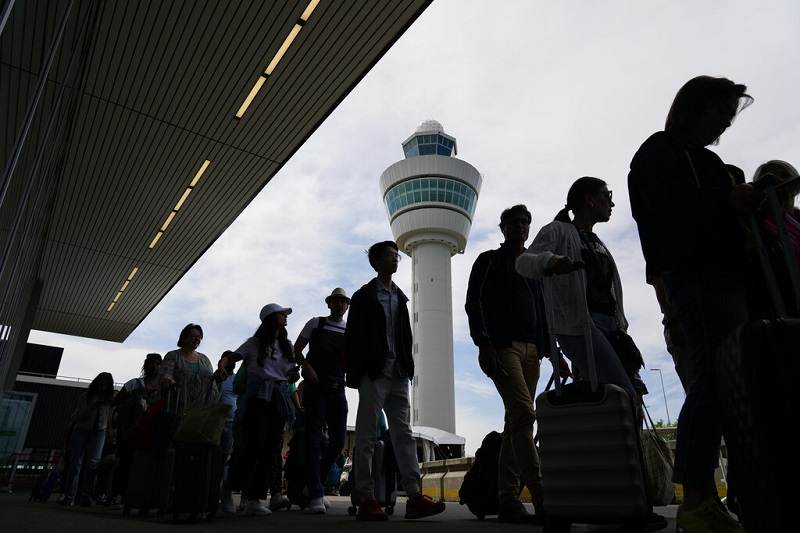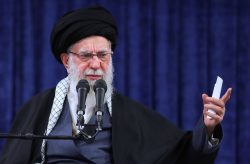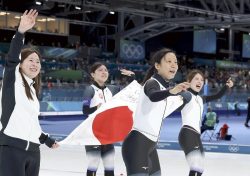
Travelers wait in long lines outside the terminal building to check in and board flights at Amsterdam’s Schiphol Airport, Netherlands, Tuesday, June 21, 2022.
17:52 JST, June 23, 2022
TALLINN, Estonia (AP) — Estonian Prime Minister Kaja Kallas has told The Associated Press that the West shouldn’t underestimate Russia’s military capabilities in Ukraine, saying Moscow is in it for the long haul as the war enters its fifth month.
Kallas said in an interview Wednesday that Europe should ensure that those committing war crimes and attempted genocide are prosecuted, noting that Russian President Vladimir Putin escaped punishment for annexing the Crimean Peninsula in 2014 and supporting an insurgency in eastern Ukraine’s Donbas region that killed over 14,000 people even before this year’s war began.
“I’ve heard talks that, you know, there is no threat anymore because they have exhausted themselves. No, they haven’t,” she said of the Russian military, which failed to take Kyiv in the early stages of the war and is now concentrating its firepower in the east.
“They have plenty of troops still who can come (to fight) — They are not counting the lives that they are losing. They are not counting the artillery that they are losing there. So I don’t think that we should underestimate them in the longer term to still keep this up,” Kallas said, despite the low morale and corruption troubling Moscow’s forces.
Kallas praised the unity that Europe has shown in punishing Russia for the invasion that began Feb. 24, even though she said it was clear from the beginning that it would be “more and more difficult over time” to hang together.
“First, we did the sanctions that were relatively easy. Now we move to sanctions that are much more difficult. But so far, we have managed to get the unity, even if we have different opinions,” she said in the interview in Stenbock House, a government building where she has her office and holds Cabinet meetings..
“This is normal for democracy. We debate, we discuss, and then we get to the solution. So far, it has been a negative surprise to Putin that we are still united,” Kallas said.
She said she was hopeful that Ukraine will be granted candidate status for the European Union at the bloc’s upcoming summit in Brussels, despite the initial divisions over it. The EU’s executive arm, the European Commission, threw its weight behind Ukraine’s candidacy last week.
Some countries “were very skeptical two months ago,” Kallas said, but now there are “different signals coming from different member states … that they are on board.”
Estonia, which shares a 294-kilometer (about 180-mile) border with Russia, has taken a hard-line stance over Russia’s invasion of Ukraine. Kallas has criticized other European leaders for talking to Putin and has advocated for isolating Moscow completely, leaving the decision on how to end the war up to Ukraine.
As the war has dragged on, some in the West have suggested reaching a negotiated peace deal with Russia — even if it meant that Ukraine would give up territory. Kallas has warned against it.
In her comments to the AP, she pointed out that this is exactly what happened after Moscow annexed Crimea, backed the separatists in the industrial Donbas and seized territory in the former Soviet republic of Georgia.
“For us, it is important to not make that mistake again like we did in Crimea, Donbas, Georgia,” she said. “We have done the same mistake already three times saying that, you know, negotiations, negotiated peace is the goal. … The only thing that Putin hears from this is that ‘I can do this because no punishment will follow.’
“And every time, every next time will be with more human suffering than the last one was,” she added.
In Ukraine, those committing war crimes and “conducting or trying to conduct genocide” should be prosecuted.
Sanctions against Russia will take effect over time, she said, and one just needs to have “strategic patience.”
Kallas defended criticism that the sanctions appear to hurt ordinary Russians while failing to deter Putin so far.
“And I still think that, you know, the effects should be felt by the Russian population as well, because if you look, the support for Putin is very high,” she said.
Kallas added that Russian soldiers are bragging about war crimes they commit “to their wives and to their mothers. And if the wives and mothers say that ‘This is OK what you are doing there’ … I mean, this is also the war that Russia and Russian people are holding up in Ukraine,” she said.
On the domestic front, the 45-year-old Kallas is fighting for her political future as Estonia’s two-party government led by her center-right Reform Party fell apart early June as she kicked out junior partner Center Party following disputes over welfare and spending issues amid rampant inflation in the Baltic nation.
Earlier this month, Kallas who has led the Reform Party since 2018 and became Estonia’s first female prime minister in January 2021, started coalition talks with two other parties and they are expected to reach a coalition deal by early July.
If not, Kallas will face the grim prospect of governing a weak one-party minority government until the next general election scheduled for March.
Top Articles in News Services
-

Prudential Life Expected to Face Inspection over Fraud
-

Hong Kong Ex-Publisher Jimmy Lai’s Sentence Raises International Outcry as China Defends It
-

Japan’s Nikkei Stock Average Touches 58,000 as Yen, Jgbs Rally on Election Fallout (UPDATE 1)
-

Trump Names Former Federal Reserve Governor Warsh as the Next Fed Chair, Replacing Powell
-

Suzuki Overtakes Nissan as Japan’s Third‑Largest Automaker in 2025
JN ACCESS RANKING
-

Japan Institute to Use Domestic Commercial Optical Lattice Clock to Set Japan Standard Time
-

Israeli Ambassador to Japan Speaks about Japan’s Role in the Reconstruction of Gaza
-

Man Infected with Measles May Have Come in Contact with Many People in Tokyo, Went to Store, Restaurant Around When Symptoms Emerged
-

Prudential Life Insurance Plans to Fully Compensate for Damages Caused by Fraudulent Actions Without Waiting for Third-Party Committee Review
-

Woman with Measles Visited Hospital in Tokyo Multiple Times Before Being Diagnosed with Disease



























